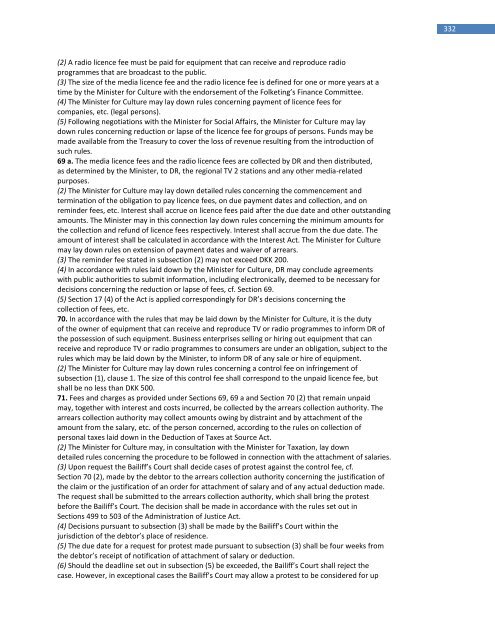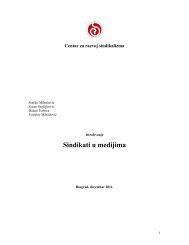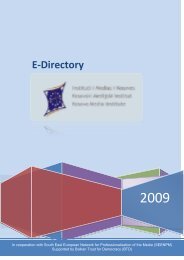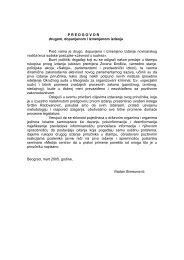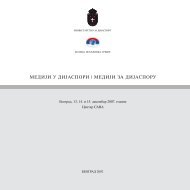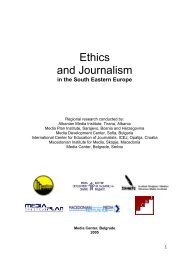Media Study - Medija centar Beograd
Media Study - Medija centar Beograd
Media Study - Medija centar Beograd
Create successful ePaper yourself
Turn your PDF publications into a flip-book with our unique Google optimized e-Paper software.
(2) A radio licence fee must be paid for equipment that can receive and reproduce radio<br />
programmes that are broadcast to the public.<br />
(3) The size of the media licence fee and the radio licence fee is defined for one or more years at a<br />
time by the Minister for Culture with the endorsement of the Folketing’s Finance Committee.<br />
(4) The Minister for Culture may lay down rules concerning payment of licence fees for<br />
companies, etc. (legal persons).<br />
(5) Following negotiations with the Minister for Social Affairs, the Minister for Culture may lay<br />
down rules concerning reduction or lapse of the licence fee for groups of persons. Funds may be<br />
made available from the Treasury to cover the loss of revenue resulting from the introduction of<br />
such rules.<br />
69 a. The media licence fees and the radio licence fees are collected by DR and then distributed,<br />
as determined by the Minister, to DR, the regional TV 2 stations and any other media-related<br />
purposes.<br />
(2) The Minister for Culture may lay down detailed rules concerning the commencement and<br />
termination of the obligation to pay licence fees, on due payment dates and collection, and on<br />
reminder fees, etc. Interest shall accrue on licence fees paid after the due date and other outstanding<br />
amounts. The Minister may in this connection lay down rules concerning the minimum amounts for<br />
the collection and refund of licence fees respectively. Interest shall accrue from the due date. The<br />
amount of interest shall be calculated in accordance with the Interest Act. The Minister for Culture<br />
may lay down rules on extension of payment dates and waiver of arrears.<br />
(3) The reminder fee stated in subsection (2) may not exceed DKK 200.<br />
(4) In accordance with rules laid down by the Minister for Culture, DR may conclude agreements<br />
with public authorities to submit information, including electronically, deemed to be necessary for<br />
decisions concerning the reduction or lapse of fees, cf. Section 69.<br />
(5) Section 17 (4) of the Act is applied correspondingly for DR’s decisions concerning the<br />
collection of fees, etc.<br />
70. In accordance with the rules that may be laid down by the Minister for Culture, it is the duty<br />
of the owner of equipment that can receive and reproduce TV or radio programmes to inform DR of<br />
the possession of such equipment. Business enterprises selling or hiring out equipment that can<br />
receive and reproduce TV or radio programmes to consumers are under an obligation, subject to the<br />
rules which may be laid down by the Minister, to inform DR of any sale or hire of equipment.<br />
(2) The Minister for Culture may lay down rules concerning a control fee on infringement of<br />
subsection (1), clause 1. The size of this control fee shall correspond to the unpaid licence fee, but<br />
shall be no less than DKK 500.<br />
71. Fees and charges as provided under Sections 69, 69 a and Section 70 (2) that remain unpaid<br />
may, together with interest and costs incurred, be collected by the arrears collection authority. The<br />
arrears collection authority may collect amounts owing by distraint and by attachment of the<br />
amount from the salary, etc. of the person concerned, according to the rules on collection of<br />
personal taxes laid down in the Deduction of Taxes at Source Act.<br />
(2) The Minister for Culture may, in consultation with the Minister for Taxation, lay down<br />
detailed rules concerning the procedure to be followed in connection with the attachment of salaries.<br />
(3) Upon request the Bailiff’s Court shall decide cases of protest against the control fee, cf.<br />
Section 70 (2), made by the debtor to the arrears collection authority concerning the justification of<br />
the claim or the justification of an order for attachment of salary and of any actual deduction made.<br />
The request shall be submitted to the arrears collection authority, which shall bring the protest<br />
before the Bailiff’s Court. The decision shall be made in accordance with the rules set out in<br />
Sections 499 to 503 of the Administration of Justice Act.<br />
(4) Decisions pursuant to subsection (3) shall be made by the Bailiff’s Court within the<br />
jurisdiction of the debtor’s place of residence.<br />
(5) The due date for a request for protest made pursuant to subsection (3) shall be four weeks from<br />
the debtor’s receipt of notification of attachment of salary or deduction.<br />
(6) Should the deadline set out in subsection (5) be exceeded, the Bailiff’s Court shall reject the<br />
case. However, in exceptional cases the Bailiff’s Court may allow a protest to be considered for up<br />
332


